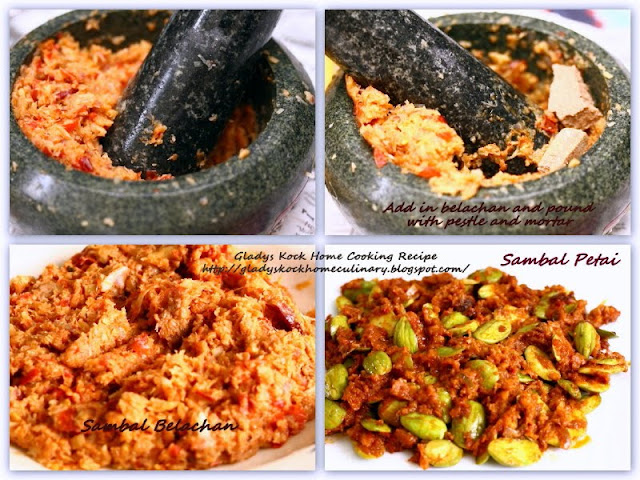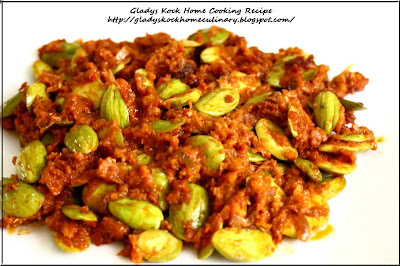Sambal Belachan and Sambal Petai
Whilst my hubby and I found this irresistable famous nyonya cuisine intriguing, some detest petai bean due to its stinky and peculiar smell. Well, petai is like durian, whether you adore it or abhor it, there's no ambivalent or in between. Luckily we both are on the same wavelength on the tastebuds, else one'd have to tolerate with the other's preference when it comes to meal preparation.
The dish highlights the petai in itself by pairing it with this spicy sambal belachan, a stinky but luscious Malaysian condiment made from shrimp paste, red chilli peppers (fresh or/and dried), shallots, garlic, dried shrimp, lemongrass and also some tamarind juice to flare up the sourness. Just a reminder, hours after the petai, your excretions will have a very pungent petai odor - stinky urine, smelly breath or burp, strong-smelling flatulence et cetera. Despite this, it should not serve as a deterrent for not taking petai bean. If you take a look at its medicinal values, perhaps you'd give petai a second look you are musing! This stinky bean regulates blood pressure and reduce the risk of stroke as it's high in potassium yet low in salt, cure depression, treat PMS (premenstrual syndrome), cure anaemia and among others, overcome the problem of constipation and the list goes on.
If you fancy, you can add some medium to large shrimps (trimmed and shelled) for a more substantial dish, which is known as sambal petai udang, or mingle it with tempeh (fermented soy bean cake that originates from Indonesia). Well, it's actually up to individual preference, you can just tweak it to suit your tastebuds. One thing good about home-cooked meal is, the approach is never rigid. Sometimes, you'll find that coming up with unusual dishes is akin to creating a piece of modern art, which rejuvenate your artful imagination.
Here's the how-to recipe for home-cooked sambal petai. Let's meld tangy and savory with this easy recipe.
Ingredients :
150g petai bean, skinned and cleaned, split the bean into two with a paring knife (to isolate the bean with worms that burrow their way into the heart of the petai)
Seasoning :
1/2 tsp salt
1/2 tsp sugar
For Sambal Paste :
5 fresh red chilli peppers (fresh cayenne peppers), seeded 红辣椒
5 dried red chillies, seeded 干辣椒
150g dried shrimp, soaked and drained 虾米
2 cm turmeric (kunyit in Malay or 黄姜 in Chinese)
5 shallots 葱头子
5 pips garlic 蒜头
1/2 tsp tamarind paste (asam jawa in Malay)
1cm Asian shrimp paste (known as belachan locally) 峇拉煎
1 stalk lemongrass (serai in Malay or 香茅 in Chinese)
80ml water
Method :
1. Mix tamarind paste with water and squeeze out tamarind juice, set aside.
2. Half-fill a pot of water and boil, blanch all the petai with boiling water. Then dish up and drain on a metal sieve.
3. Peel shallots and garlic. Pound shallots, garlic and dried shrimp using a pestle and mortar. Then add in red chillies and dried chillies, pound again until fine. At this point, add in turmeric, belachan and lemongrass, pound until the mixture becomes a smooth paste. Alternatively, you can use blender or food processor to blend the ingredients instead of pestle and mortar.
4. Heat up 4 tbsp oil and saute the pounded paste until the paste emanates a fragrant smell. Add in petai and stir-fry for 1-2 minutes. Then add in water and tamarind juice, then bring to a simmer. Add in seasoning and serve hot with steamed white rice.


This looks really good! :)
ReplyDeleteYUm... you've no idea how much I love this dish! haha... Actually, I made some sambal shrimp for lunch just now without belachan & petai. Still yummy tasty good. *My kids don't like belachan & petai* So, I decided not to go with those ingredients.
ReplyDelete